Since we entrust the future of North Carolina — the state’s children — into the hands of schools every day, we must hold them accountable. How we do that is important.
Since 2015, the state has graded every public, charter, and alternative school on a 15-point A-F scale. The letter grade each school receives annually is determined by a formula — 80 percent is based on student achievement and 20 percent comes from students’ growth year to year.
The school performance grades are published on the State Board of Education’s website. Here are those grades for 2015-16.
There’s been much discussion and debate around the formula and the scale. In the last legislative session, the Senate and House had different ideas of how the grading process should work. In the Senate’s proposed budget, lawmakers suggested switching to a 10-point scale, while the House wanted to stick with the 15-point version. The Senate wanted the 80-20 formula and the House proposed changing to a 50-50 formula — where achievement and growth would have equal weight in the school’s grade. In the end, the grading system remains on a 15-point scale with an 80-20 formula.
These numbers matter because they have implications for schools. A 10-point scale produces a larger number of schools with low grades. If a school receives a D or F letter grade and meets or does not meet the state’s growth standards, it is considered “low-performing.” With this status, the school must present a school improvement plan and share it with the public — identifying specific strategies to improve the grade and meet the growth standard. The numbers also have potential consequences for principals. The 2016 budget has a provision that could lead to remediation, transfer, or even dismissal for a principal of a low-performing school.
Below are maps that show the distribution of school performance grades throughout the state with different scales and ratios. To adjust these factors on your own and find specific schools in the state, go here.
The current model (80-20, 15-point scale):
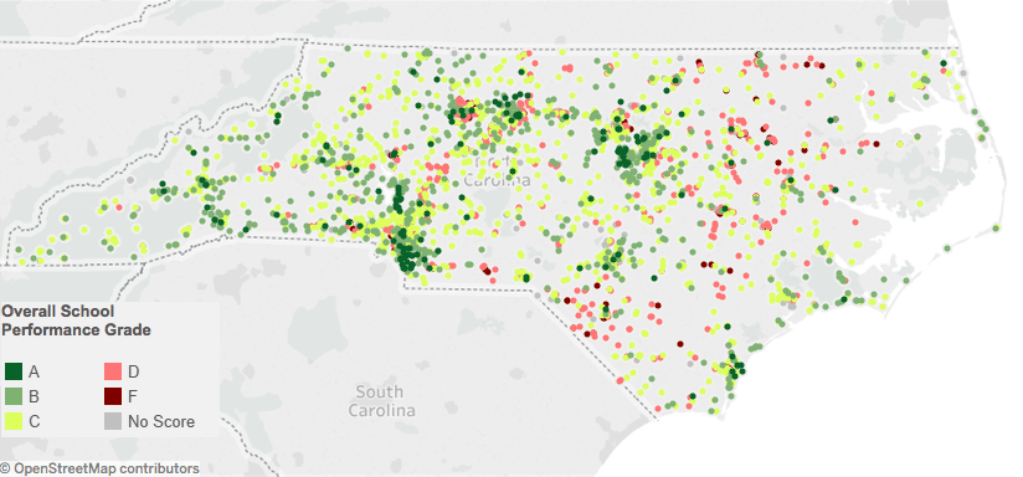

With 80 percent achievement-20 percent growth and a 10-point scale:
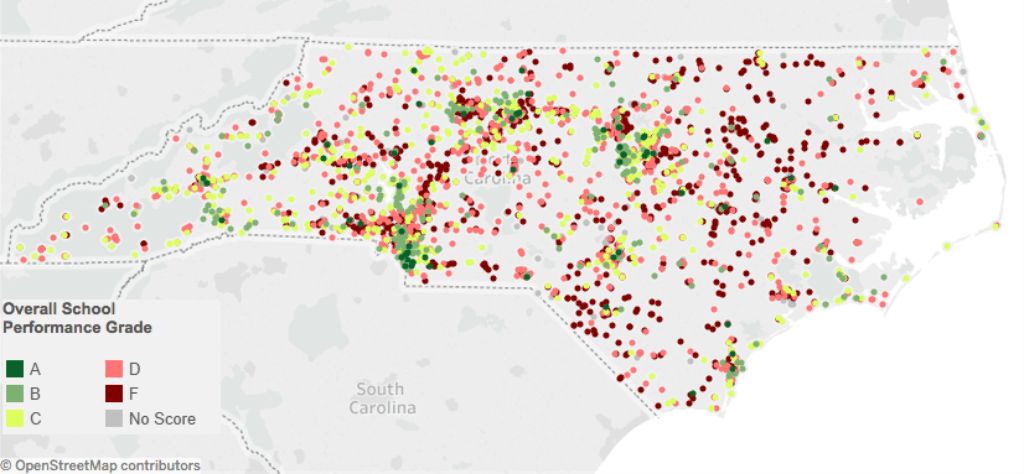

With 50 percent achievement-50 percent growth and 10-point scale:
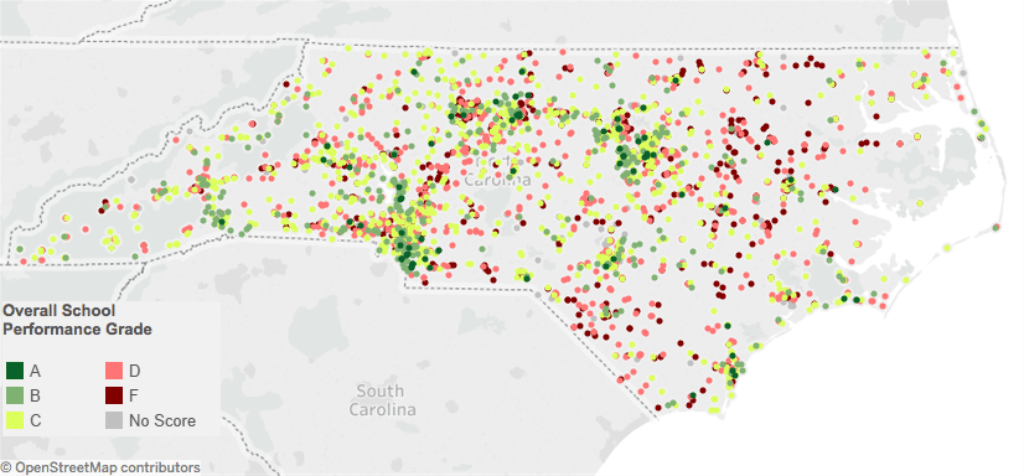

With 50 percent achievement-50 percent growth and a 15-point scale:
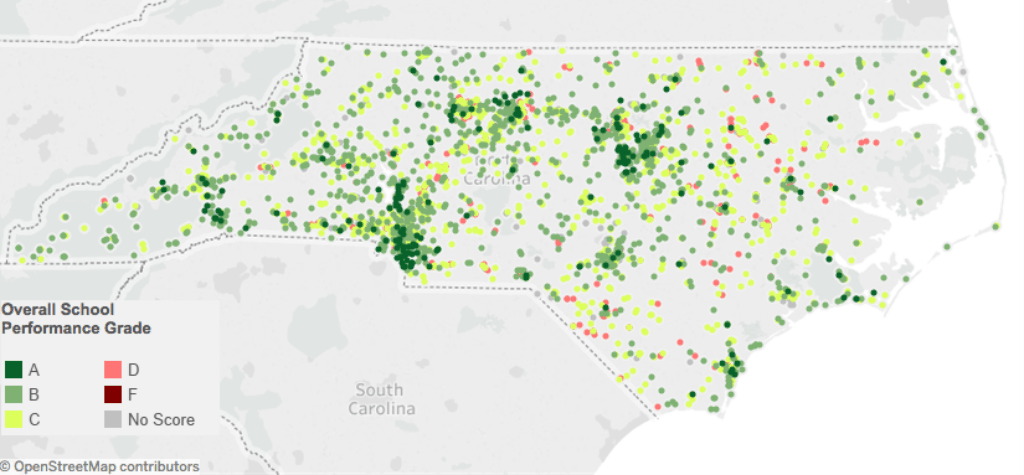

With 80 percent growth-20 percent achievement and 15-point scale:
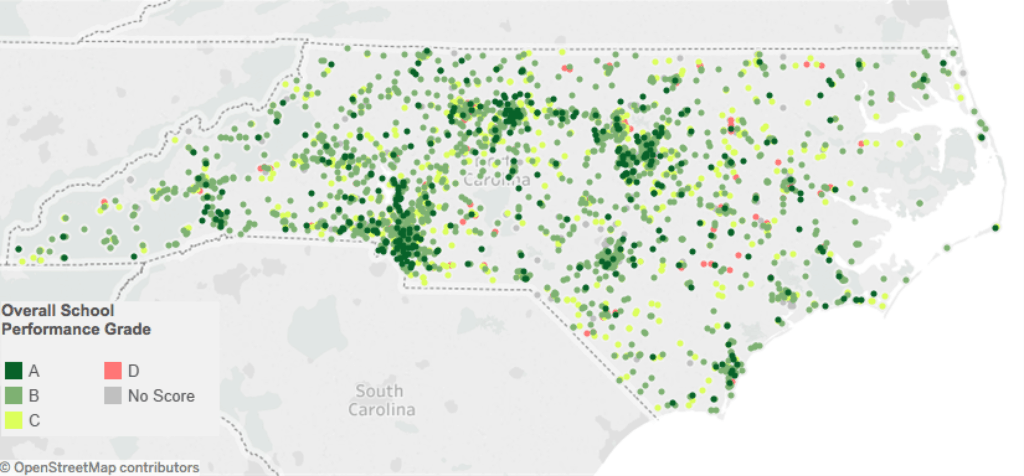

Continually low-performing schools can apply for reform models that the State Board decides whether or not to approve. These models include transformation, restart, turnaround, or closure. The restart model has received the most attention as it is the one that is being most commonly requested, and provides charter-like flexibility.
And this year, the General Assembly passed legislation that will create an Achievement School District — which will include five of the state’s lowest-performing schools and be run by a superintendent appointed by the State Board. That superintendent can contract outside entities such as charter-like operators to run the district.
Because of requirements under the federal legislation that replaced No Child Left Behind — called the Every Student Succeeds Act (ESSA) — the State Board has been brainstorming what a different accountability system would look like. Right now, the A-F system does not comply with ESSA. The Department of Public Instruction’s Director of Accountability Services, Tammy Howard, said it’s not yet clear how this will affect the A-F system and that any change of that sort is a policymaker decision.
EducationNC believes that the races for Governor, Lieutenant Governor, and Superintendent of Public Instruction will impact education policy decisions — like how to hold schools accountable — the most. Below are the candidates’ stances on school grades.
Gubernatorial
Although education is a big part of the campaign platforms of Governor Pat McCrory (R) and Attorney General Roy Cooper (D), neither candidate has spoken on the specifics of the A-F grading system. Neither candidate accepted our request to do a podcast interview.
Lieutenant Governor
When asked about the school performance grading system in a podcast with EducationNC, Lieutenant Governor Dan Forest (R) said, “I’m not the expert to really say what the percentage should be.”


But Forest emphasized the need for growth as a measurement of school quality. “If nothing else, the growth model encourages those schools that aren’t doing so well,” he said.
Forest was clear that performance also matters. He said that growth can seem like a success when students’ achievement still isn’t up-to-par.
“Sometimes, we see growth numbers that are like one-tenth of one percent and people sit around and cheer and say, ‘Oh, good. We’re growing.'” Forest said. “Well, at that rate, it’s going to take us 100 years to achieve proficiency in some of these subjects.”
Forest added that he wasn’t “a fan” of the A-F grades at first, but that he now recognizes the need for some kind of system. “You have to set the bar somewhere,” he said. But he also raised some of the issues inherent in school grading systems:
“The challenge with any kind of grading system like that is the same challenge we’ve had with testing in NC forever. You can set the bar and then you can manipulate numbers over time however you want to manipulate the numbers. And sometimes you can act like you’re improving when you’re not and vice versa. So that’s a really difficult challenge.”
Forest said he and his wife started homeschooling their children because the elementary school his son would’ve attended was ranked second to last in the state. We asked him if he would send his kid to a D or F school. He said probably not, but added many caveats.
“It would probably depend upon a lot circumstances,” Forest said. “Do I know these teachers? Do I know these principals? Do I trust them? Do I know that they love my kids and they’re pouring into my kids? Can they get a good education at that D or F school? Just because it’s a D or F school doesn’t mean that everything about the school is bad. It doesn’t mean you have a bad teacher, doesn’t mean you have a bad principal.”


Democratic challenger Linda Coleman, on the other hand, would like a complete overhaul of the system. Get rid of the grades, she said in a podcast with EducationNC.
“To put that kind of label on a school further serves to denigrate or really move our state in a direction that we do not need to be going in,” Coleman said.
She said those kinds of labels put a sort of stigma on schools that detract people from attending. Even with the appropriate resources, Coleman said, that reputation can hurt the school’s potential and ability to attract a diverse student population.
“What we need to do, instead of labeling these schools and trying to put them into separate school districts and further labeling them, we need to make sure we are putting the resources we need, the teachers that we need,” Coleman said.
She said the best teachers should be in the lowest-performing schools and should have access to resources, appropriate pay, textbooks, and technology.
Coleman said she would not want to send her child to a D or F school.
“And that is exactly what the point is. You know, somebody has to go there or else you are not going to have a school.”
Superintendent of Public Instruction


The Superintendent of Public Instruction June Atkinson (D), who is running for her fourth term, stressed the importance of growth in calculating school performance grades in a podcast with EducationNC.
“A true measure of how a school is doing is what they do with a child who comes to the school the first day and where that student ends in learning at the end of the school year,” Atkinson said. “And growth measures that.”
Atkinson suggested at least a 50-50 formula for the A-F system. She proposed a model where growth would count for more than half of the grade at the elementary and middle school level and implementing the 50-50 ratio at high school.
“That’s an area where we are getting feedback across the state from our educators,” she said.
Atkinson said that the grades were only a snapshot of the school and did not reflect the quality of learning. She said she’s visited several of the D and F schools and would feel comfortable sending her own children to any of them.
Republican challenger Mark Johnson agreed that there needs to be a shift to focus more on growth.


Johnson said in a podcast with EducationNC that a lot of local school districts have already made that shift.
In the Winston-Salem/Forsyth County Schools, where Johnson is on the local board of education, the district puts out the schools’ A-F grades with another metric that takes poverty into account.
“…We give them a bump or a plus to signify that they are in poverty,” Johnson said. “So you should take that with greater weight that there’s growth in these schools where it’s harder to grow.”
When we asked if he would send his child to a D or F school, Johnson said he would not.
“I will be completely honest with you, the neighborhood I would move into would probably have a good school and that’s where she would go,” Johnson said. “But that is also why I support school choice.”
Johnson said he sees school choice as a way for parents who live in districts with continually low-performing public schools to provide the same opportunities to their children as Johnson can for his.
“And again, I am running for this office because I want every school to be able to afford that opportunity to those students,” he said. “I am a true believer in traditional public schools.”





